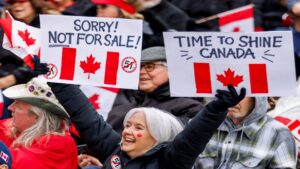The Shifting Tides: How Canadians are Reevaluating Travel to the U.S.
In March 2025, a wave of protests known as "Elbows Up" emerged from our neighbors to the north. Canadians gathered at Nathan Phillips Square in Toronto to voice their discontent against U.S. tariffs and the broader political climate under President Donald Trump. This event not only highlighted Canadians’ grievances but also underscored an emerging trend: many Canadians are reconsidering their trips to the United States.
This trend is cause for concern, particularly for the American travel industry that generates over $1 trillion annually. With a staggering travel deficit of over $51 billion last year, the stakes are high. Let’s explore why Canadians are opting to stay home and how this could impact both economies.
The Economics of Travel: Why Are Canadians Staying Home?
The decision to skip trips to the U.S. is influenced by several factors:
-
Currency Exchange Rates: The unfavorable exchange rate is forcing many Canadians to rethink their travel budgets. Traveling to the U.S. has become increasingly costly, leading many to explore domestic options or travel to other countries where their dollar goes further.
-
Political Climate: The political rhetoric surrounding issues such as tariffs, immigration policies, and even public remarks about annexing Canada have fostered a sense of unease among Canadians. The recent detentions of travelers, even those holding valid visas, have only added to these apprehensions.
- Alternative Destinations: With travel logistics becoming cumbersome and potentially less hospitable in the U.S., many Canadians are redirecting their travel plans to countries like Mexico and other Caribbean destinations. Interestingly, data shows that some Canadians are even considering trips to Europe, often finding that the overall cost can be comparable or even cheaper than traveling south to the U.S.
A Government Response
In response to growing concerns voiced by previous Prime Minister Justin Trudeau, the Canadian government is encouraging citizens to "choose Canada." Initiatives promoting local travel aim to boost the tourism sector while showcasing the beautiful landscapes and attractions that Canada has to offer—national parks, historical sites, and vibrant cities all beckon.
The Impact on U.S. Travel Industry
The ripple effects of this Canadian shift in travel patterns are significant. The U.S. Travel Association has expressed worries about the nation’s "welcomeness" and its potential implications for a slowing economy.
-
Declining Travel Figures: Data reveals a 13% drop in Canadians returning via air and a staggering 23% decline in car travel over the last year. Notably, hotels in border areas like Bellingham, Washington, have reported an 8% decrease in demand.
- Changing Airlines Routes: Canadian airlines, such as Flair and WestJet, are adjusting their routes. Citing shifts in consumer demand, they are reducing service to U.S. destinations and focusing on travel to sunnier locations where demand remains strong.
Growing Travel Warnings: A New Dynamic
The landscape of international travel is further complicated by increasing travel warnings issued by several European nations regarding travel to the United States. Alerts from Germany, the UK, and Denmark enumerate concerns such as detentions and the complexities surrounding gender identification. These warnings could deter first-time travelers and inflict lasting damage on the U.S. tourism image.
As tourism specialists caution, once a destination’s reputation is tarnished, regaining trust and business can take considerable time and financial resources.
What Lies Ahead for Inbound Travel?
With issues of safety, fluctuating dollar values, and a complex political environment, both the U.S. and Canada must confront the reality that the travel dynamics between these two nations are changing.
The U.S. must actively address the perceptions of unwelcomeness and implement effective strategies to enhance the travel experience. As the Biden administration looks to reshape America’s image on the global stage, there is a tremendous opportunity for collaboration with Canadian officials to restore confidence among travelers.
At Extreme Investor Network, we stay committed to monitoring these trends and their implications for investments, particularly in tourism and travel-related sectors. With billions of dollars on the line, how both nations respond to these challenges could significantly shape their economic landscapes in the years to come.
Travel is an integral component of cultural exchange and economic interdependence. As we move forward, it’s essential for both nations to foster a friendly and welcoming environment that encourages international exploration.
Stay tuned with us for further insights into these evolving situations and how they may impact your investment strategies in the future!

